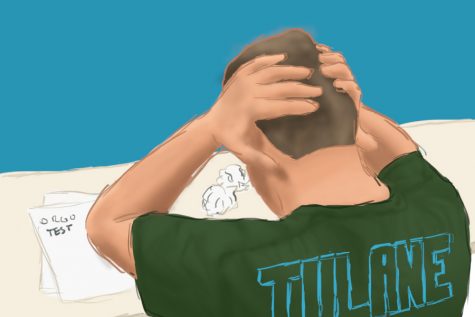Student athletes with learning accommodations at risk for differential treatment
April 24, 2019

*Editor’s Note: Sarah is an undergraduate student at Tulane University whose name has been changed to protect her anonymity.
While working as a tutor for Tulane athletics, undergraduate student Sarah* regularly worked with athletes who were struggling with their schoolwork. Because Tulane athletics evaluates each incoming athlete for learning disabilities such as ADHD, dyslexia, ADD, among others, Sarah is accustomed to working with students who receive accommodations.
After speaking with a struggling student without accommodations, however, Sarah was concerned that the player may have an undiagnosed learning disability.
“I went to my boss, I went to him, and said separately, ‘You need to get re-evaluated,’” Sarah said. “[He said,] ‘Well I don’t want to do that, because I’ve already been evaluated, and what is my team going to think?’”
As of 2012, approximately 11% of college students self-reported a learning disability diagnosis. While the exact number of athletes with learning disabilities competing in the NCAA is unknown, a 2007 survey compiled by National Association of Academic Advisors for Athletics estimated that 2.7% of college athletes have a learning disability.
Some have argued that this figure may underestimate the proportion of college athletes with a learning disability. An academic advisor who worked for the Florida State University football team estimated that, at the time of her departure in 2007, about one-third of the football team had a learning disability, though many were not formally diagnosed until they arrived at school.
For this reason, however, other FSU athletes have argued that this particular figure is inflated. These critics claim that advisors sought to boost athletes’ grades by helping them receive these accommodations. A former receiver at FSU, Fred Rouse, said in a 2009 ESPN interview that he feels such accommodations stem from the laziness of college athletes.
“You [as a high school athlete] have all of this time to prepare [academically] before you get to this level,” Rouse said. “Then when you get here, you play this punk role as, you know, ‘I have a learning disability,’ when that’s not the case.”
The potential stigma around receiving accommodations can be detrimental to the mental health of college athletes with such disabilities. Some studies have shown that college athletes with accommodations are more likely to experience poor self-esteem, self-doubt and social issues.
The NCAA, in response to this issue, provides the following statement on their website for those playing on an NCAA team with a learning disability.
“Because concern about discrimination is so prevalent, some students decide not to disclose [their learning disability], even though they often forfeit needed services and accommodations” Marcia Ridpath, disability consultant to the NCAA, said in the statement.
Shawna Foose, the assistant director of Tulane’s Goldman Center for Student Accessibility, says the visibility of accommodations is sometimes a concern for Tulane students, whether or not the students themselves actually experience discrimination.
“I have had new students express concern about stigma, but I have not had any reports of concrete examples” Foose said. “We encourage any student to meet with our staff to discuss their challenges and determine the best plan for them.”
Still, there is at least one example of a Tulane athlete struggling with the stigma around his accommodations. After being removed from the football team in 2015, Brandon Purcell sued his former coaches and school administrators. Among other claims, Purcell argued that his coaches and team intentionally inflicted harm against him because of his accommodations.
According to an official court document archived online, Purcell made the following claims against Doug Lichtenberger, a special teams coach.
“[Purcell] alleged that Lichtenberger did not believe that Purcell was disabled, required him to prove his disability, disregarded his accommodation, kicked him off the football team, and taunted him,” District Judge Jane Triche Milazzo said in the document. “[Purcell] further alleged that Lichtenberger’s actions prompted the other players to become abusive toward Purcell.”
These claims were dismissed by the court, as there was no proof of Lichtenberger’s intent to harm Purcell. The veracity of Purcell’s allegations appears not to have been questioned, though the document provided online provides no evidence that these claims are true beyond Purcell’s testimony.
Lichtenberger has since left Tulane, but these allegations, coupled with the general culture surrounding learning disabilities in the realm of athletics, show a potential trend toward a concerning stigma. Student-athletes must already balance multiple commitments. The lack of accommodations would simply add another stressor to their busy lives.
Tulane Athletics declined to comment on this case.









Edward Proulx • Jun 23, 2019 at 10:33 am
…
So, nice article
Harold A Maio • Apr 25, 2019 at 2:08 pm
—-Investigating learning disability accommodation —stigma —
May I express my regrets that anyone has placed that thought in your mind.
Harold A Maio